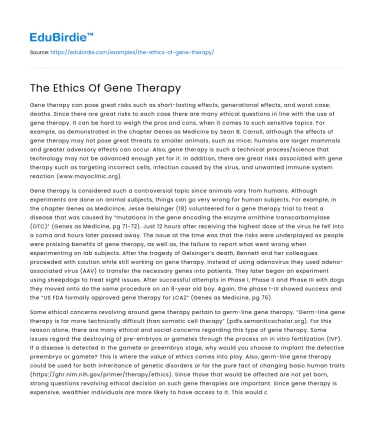Gene therapy can pose great risks such as short-lasting effects, generational effects, and worst case; deaths. Since there are great risks to each case there are many ethical questions in line with the use of gene therapy. It can be hard to weigh the pros and cons, when it comes to such sensitive topics. For example, as demonstrated in the chapter Genes as Medicine by Sean B. Carroll, although the effects of gene therapy may not pose great threats to smaller animals, such as mice; humans are larger mammals and greater adversary effects can occur. Also, gene therapy is such a technical process/science that technology may not be advanced enough yet for it. In addition, there are great risks associated with gene therapy such as targeting incorrect cells, infection caused by the virus, and unwanted immune system reaction (www.mayoclinic.org).
Gene therapy is considered such a controversial topic since animals vary from humans. Although experiments are done on animal subjects, things can go very wrong for human subjects. For example, in the chapter Genes as Medicince, Jesse Gelsinger (18) volunteered for a gene therapy trial to treat a disease that was caused by “mutations in the gene encoding the enzyme ornithine transcarbamylase (OTC)” (Genes as Medicine, pg 71-72). Just 12 hours after receiving the highest dose of the virus he fell into a coma and hours later passed away. The issue at the time was that the risks were underplayed as people were praising benefits of gene therapy, as well as, the failure to report what went wrong when experimenting on lab subjects. After the tragedy of Gelsinger’s death, Bennett and her colleagues proceeded with caution while still working on gene therapy. Instead of using adenovirus they used adeno-associated virus (AAV) to transfer the necessary genes into patients. They later began an experiment using sheepdogs to treat sight issues. After successful attempts in Phase I, Phase II and Phase III with dogs they moved onto do the same procedure on an 8-year old boy. Again, the phase I-III showed success and the “US FDA formally approved gene therapy for LCA2” (Genes as Medicine, pg 76).
Save your time!
We can take care of your essay
- Proper editing and formatting
- Free revision, title page, and bibliography
- Flexible prices and money-back guarantee
Some ethical concerns revolving around gene therapy pertain to germ-line gene therapy. “Germ-line gene therapy is far more technically difficult than somatic cell therapy” (pdfs.semanticscholar.org). For this reason alone, there are many ethical and social concerns regarding this type of gene therapy. Some issues regard the destroying of pre-embryos or gametes through the process on in vitro fertilization (IVF). If a disease is detected in the gamete or preembryo stage, why would you choose to implant the defective preembryo or gamete? This is where the value of ethics comes into play. Also, germ-line gene therapy could be used for both inheritance of genetic disorders or for the pure fact of changing basic human traits (https://ghr.nlm.nih.gov/primer/therapy/ethics). Since those that would be affected are not yet born, strong questions revolving ethical decision on such gene therapies are important. Since gene therapy is expensive, wealthier individuals are more likely to have access to it. This would cause a greater divide among people regarding socioeconomic status and availability to all “consumers.”
A great ethical concern regarding germ-line gene therapy is the affects on future generations. Normal medical interventions cause their own risks to individuals, however germ-line gene therapy poses risks to future generations. Also note, that “deleterious consequences may not become manifest in the first generation” which can cause even greater issues down the line of further generations (pdfs.semanticscholar.org). Since germ-line gene therapy affects more than just an individual, ethical debates are still taking place to determine the ethics behind such gene therapy.
Overall, I personally view gene therapy as a topic for such great debate as it can have bad effects. Also, if at some point gene therapy does become legalized and “perfected,” then it can be used just as a source to “create” more picture-perfect humans rather than to cure/fix diseases that are inherited. It is a science that could potentially end up misused and still has a bit of a way to go before human trials can be performed due to such negative risks, for example death. Germ-line gene therapy also raises more ethical issues than somatic cells therapy and most likely needs to be further studied before full decisions can be made. Due to the effects on sperm cells and eggs germ-line therapy has more of an impact on future generations as well which can become problematic in society.






 Stuck on your essay?
Stuck on your essay?

